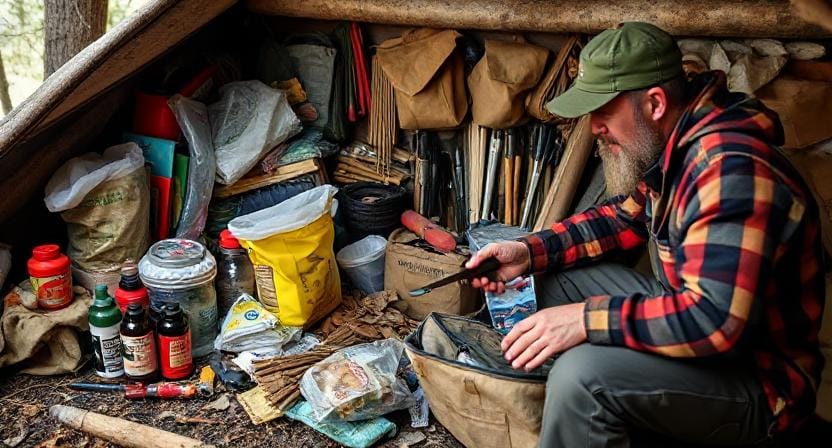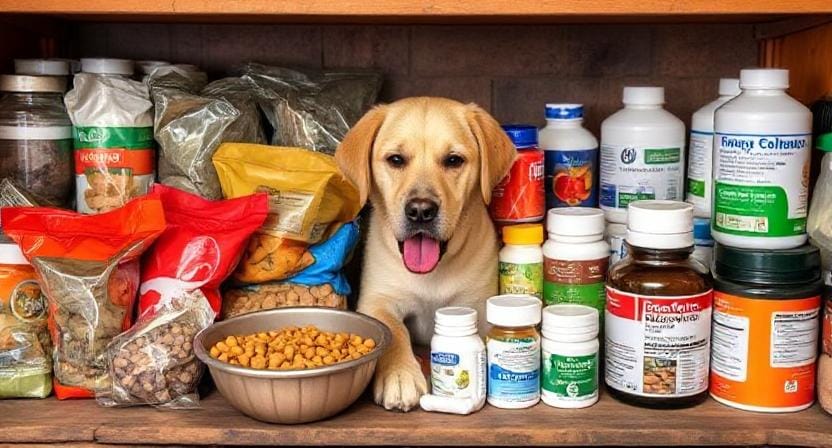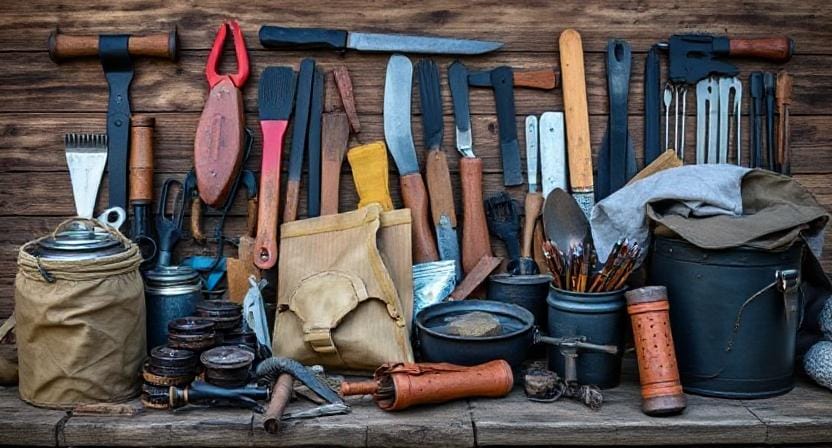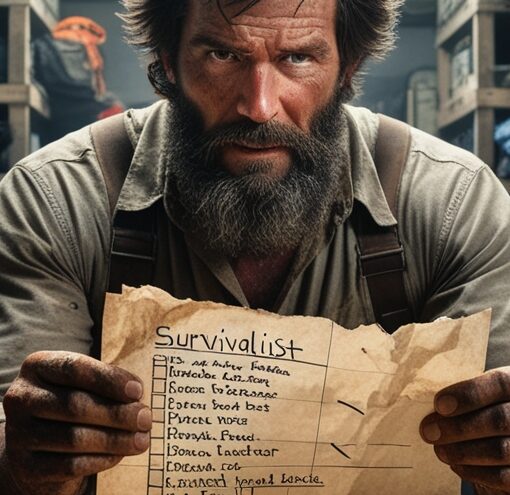Top Takeaways and Key Concepts
- Prioritize essentials first by stocking long-lasting food, clean water, and medical supplies.
- Build your stockpile gradually by adding a few survival items to each weekly shopping trip.
- Include hygiene and health items like soap, toothpaste, sanitizer, and medications.
- Prepare for pets too by storing extra pet food and basic animal care supplies.
- Stay practical, not extreme by avoiding overbuying and focusing on realistic emergency needs.
Summary of This Article
This article explains why smart stockpiling is not hoarding but a practical form of preparedness for emergencies like storms, shortages, or unexpected life disruptions. It encourages starting with essentials such as canned foods, bottled water, hygiene products, and first-aid supplies while also caring for pets and medications. The message emphasizes peace of mind, cost savings, and self-reliance while warning against panic buying. With simple planning and steady effort, anyone can build a reliable emergency supply without stress or fear.
Short Video Version of this Article
Let’s talk about hoarding. No, I’m not telling you to start collecting toilet paper like it’s a rare treasure.
Please Note: This post may contain affiliate links. If you click one of them, we may receive a commission at no extra cost to you. As an Amazon Associate, I earn from qualifying purchases.
We’re actually just talking about being clever and ready for the times when things don’t go as planned. Sometimes life may be a little crazy, right? Like when the huge pandemic hit. It was a surprise to everyone, and it taught us how crucial it is to be ready for everything.
Okay, so imagine this: you’re at home, everything is good one minute, and then bang! A major storm comes, or maybe you just can’t get to the store for a week. You want to make sure you and your family are safe. It only takes a little bit of planning to make a big difference.

When you think about what to stock up on, start with the fundamentals. Think about food that lasts. Canned things are awesome. Yes, all of those: soup, beans, and vegetables. They taste excellent and are easy to hide. Don’t forget about food, though! You need something tasty to eat when things get tough. You know, chips and granola bars can really make a day better.
Water is also very important. You need enough to drink and cook with. It looks easy, but you’ll be pleased you have it when things go wrong. A couple gallons in a cool place should be enough.
And don’t forget about hygienic things, either. All the stuff you use every day, like soap, hand sanitizer, and toothpaste. Think about how annoying it is when you run out of your preferred toothpaste. If you stock up, it doesn’t imply you’re panicking; it means you’re being sensible.
Another one is pet food. You don’t want to forget about your furry friends. They also need to eat! Make sure you have some extra food and snacks for them. They’ll be there for you when things go rough, and you should take care of them.
It’s also a good idea to think about drugs. Make sure you have adequate medicine on hand if you or a family member takes it often. Things you can get without a prescription are also beneficial. Painkillers, cold medicine, and maybe some vitamins. No one likes having a stuffy nose, do they?
You don’t have to make your home a bunker anymore. A little planning can go a long way. It could seem like a lot, but just take it one step at a time. You may start by getting only a few things each week. You might even like it. Making a list may be entertaining, and before you know it, you’ll have everything you need without any stress.
And don’t forget that it’s all about feeling protected and secure. It’s not about being afraid; that’s not what we want. Having those extra things can make you feel better. You care about your family, which is clear. It’s about getting rid of some of the tension in your life so you can appreciate your coffee.
So, are you ready to go to the store now? Just in case, let’s make things a little easier for ourselves.
The Benefits of Stockpiling

Let’s talk about peace of mind for a sec. You know that calm feeling you get when you know you’re ready for anything? It’s like having a cozy blanket wrapped around you. When you’ve got your supplies ready, it can really help ease those anxious thoughts when things get rocky. No one likes surprises, especially the not-so-fun ones. It’s nice to know you’ve got a little safety net, right? And hey, you don’t even need to be a circus performer to have it.
Also, thinking about costs? Buying in bulk can save you some cash later on. Who doesn’t like a good deal? It’s like finding money in your pocket. But don’t go wild. If you end up with twenty cans of pickled herring just because it was on sale, you might find yourself regretting that choice. Stick to things you know you’ll eat.
Feeling self-sufficient is a huge plus too. It’s like having superpowers during tough times. When something unexpected happens, you can take care of yourself. You won’t have to knock on your neighbor’s door asking for food. But hey, if you’ve got extra granola bars, maybe share a couple with them, yeah? Kindness goes a long way, especially during rough patches.
When you know you can handle things yourself, it feels good—like you’re ready to tackle anything that comes your way. It’s not about being a lone wolf, though. It’s just about being prepared, and that makes a big difference. So, what do you think? Ready to plan a little, just to feel more in control? It can really change how you see things.
What Should You Stockpile?
Let’s get to work now that we’ve spoken about why stockpiling is vital. Here are the important things that every survivalist or just smart person should think about adding to their stockpile:
#1. Food Supplies

Trust me, you don’t want to be chewing on your shoe out of desperation while you’re hungry during a crisis.
– Foods that don’t go bad: canned goods such fruits, vegetables, and meats; rice; pasta; and dry beans. These infants can last a long time and will make your stomach happy.
– Freeze-Dried Meals: Great for storing for a long time and very easy to make—just add water! They taste like camping food, but there are no bugs.
– Snacks: Don’t forget your favorite foods! When things seem bad, granola bars or trail mix can help lift your spirits. And chocolate is always a wonderful option.
#2. Water

You might believe you can live on coffee alone, but you can’t!
– Bottled Water: As a starting point, each person should drink at least one gallon of water every day for three days.
– Water Purification Tablets: If you have to drink from sources that don’t seem safe (like that puddle that looks like it was frequented by neighborhood pets), these will help.
#3. A first aid kit

Things go wrong, even in times of trouble!
– Basic Supplies: Band-aids, antiseptic wipes, gauze pads, and other things you might find in a regular first aid kit, but with enough for more than just small cuts.
– Medicines: Make sure you have enough prescription drugs, pain relievers, and allergy treatments on hand.
#4 Tools & Equipment

You never know when you’ll need something useful!
– A multi-tool or Swiss Army Knife: This little item may help you with a lot of things, like opening cans and making quick fixes.
– Flashlight with Extra Batteries: No one wants to have to search for candles in the dark.
#5. Things for Personal Hygiene

Let’s not fool ourselves: even in the middle of an apocalypse, personal cleanliness is important!
– Toilet Paper and Other Sanitation Supplies: You need these things and should never forget about them, unless you like using leaves (and even then, yikes).
– Soap and hand sanitizer: Keep those germs away! Do you remember how we all suddenly became concerned with cleaning our hands? Yeah, it’s still important!
Stockpiling isn’t about making your home look like a secret bunker. It’s about being ready. Like, really ready. Peace of mind is so nice, especially when life throws curveballs. Hurricanes, unexpected snowstorms, or even just running out of snacks during movie night? We all want to be prepared for that stuff.
Think about it. When you gather important things now, you just feel better. It’s like being cozy under a blanket when it’s stormy outside. You know you’re covered and that helps you relax. Not panicking is a good thing, right?
Go ahead, grab your pen and make that shopping list. Think about what you might need. Canned food, water, a few essential first-aid things. Don’t forget the fun snacks too!
Moderation is key, though. You don’t need twenty jars of pickles unless you really want to be the pickle expert in your neighborhood. That might get a little weird, you know?
Getting prepared means being smart, and you can totally do this without going overboard. Just think of it as getting ready for life’s little surprises. Keep it simple. You got this!
Smart stockpiling is not about panic or hoarding—it’s about being prepared for emergencies with confidence and peace of mind. By prioritizing essential supplies like food, water, hygiene items, and medications, anyone can create a reliable emergency stash that protects their family during unexpected events.
Frequently Asked Questions
What is smart stockpiling?
Smart stockpiling means gathering essential supplies like food, water, and medicine in reasonable amounts so your household can function during emergencies without panic buying.
How much food should I store for emergencies?
Start with a minimum three-day supply of non-perishable foods and expand gradually to cover one to two weeks based on your family’s needs.
How much water do I need to store?
Store at least one gallon of water per person per day for drinking and basic cooking, with a goal of three to seven days minimum.
What hygiene items should I include in my stockpile?
Include toilet paper, soap, hand sanitizer, toothpaste, deodorant, feminine products, and cleaning wipes to maintain health and sanitation.
Should I stockpile medications?
Yes, keep a supply of prescription medications if applicable, plus basic over-the-counter items like pain relievers, cold medicine, and allergy pills.
Why should I include pet supplies in my emergency plan?
Pets rely on you during a crisis, so store extra pet food, water, and any medications to keep them safe and healthy.
How can I stockpile without overspending?
Build your stockpile slowly by adding a few extra items to your regular shopping trips and taking advantage of sales and bulk discounts.

Kevin Collier is a seasoned outdoor enthusiast and writer for Trekbug.com, specializing in outdoor adventures, survival strategies, and prepping insights. With a deep love for nature and a commitment to self-sufficiency, Kevin empowers readers to embrace the wilderness confidently. He shares valuable tips, practical techniques, and inspiring stories, helping both novice and experienced adventurers develop essential skills for surviving and thriving in the great outdoors.




